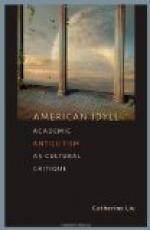In this same connection I quote from another article:—
“No one doubts the full propriety of the government’s suppressing ruthlessly any interference of the I.W.W. with war-preparation. All patriots should just as vehemently protest against all suppression of the normal protest activities of the I.W.W. There will be neither permanent peace nor prosperity in our country till the revolt basis of the I.W.W. is removed. And until that is done, the I.W.W. remains an unfortunate, valuable symptom of a diseased industrialism.”
* * * * *
I watch, along with many others, the growth of bitterness and hysteria in the treatment of labor spreading throughout our country, and I long, with many others, for Carl, with his depth and sanity of understanding, coupled with his passion for justice and democracy, to be somewhere in a position of guidance for these troublous times.
I am reminded here of a little incident that took place just at this time. An I.W.W. was to come out to have dinner with us—some other friends, faculty people, also were to be there. About noon the telephone rang. Carl went. A rich Irish brogue announced: “R—— can’t come to your party to-night.” “Why is that?” “He’s pinched. An’ he wants t’ know can he have your Kant’s ‘Critique of Pure Reason’ to read while he’s in jail.”
CHAPTER XV
I am forever grateful that Carl had his experience at the University of Washington before he died. He left the University of California a young Assistant Professor, just one rebellious morsel in a huge machine. He found himself in Washington, not only Head of the Department of Economics and Dean of the College of Commerce, and a power on the campus, but a power in the community as well. He was working under a President who backed him in everything to the last ditch, who was keenly interested in every ambition he had for making a big thing of his work. He at last could see Introductory Economics given as he wanted to have it given—realizing at the same time that his plans were in the nature of an experiment. The two textbooks used in the first semester were McDougall’s “Social Psychology” and Wallas’s “Great Society.” During part of the time he pinned the front page of the morning paper on the board, and illustrated his subject-matter by an item of news of that very day.
His theory of education was that the first step in any subject was to awaken a keen interest and curiosity in the student; for that reason he felt that pure theory in Economics was too difficult for any but seniors or graduates; that, given too soon, it tended only to discourage. He allowed no note-taking in any of his courses, insisted on discussion by the class, no matter how large it was, planned to do away with written examinations as a test of scholarship, substituting instead a short oral discussion with each student




